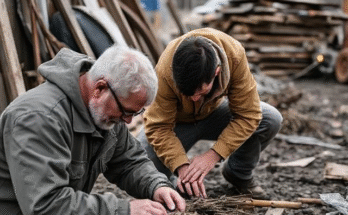INTRODUCTION
In a constantly noisy and distracting world, an excellent listener is a little known secret goods — rare and worth their weight in gold. Deep listening is a quiet power that is rarely acknowledged. While the majority scramble to state their case, the few who are profoundly listening learn things that the talkers miss — insights, wisdom and insight that aren’t on the agenda.
They take in not only words but feelings, meaning, and points of view, finding rich empathy and greater understanding.
Hearing without listening is as empty as spending time with someone without connecting, and requires patience, empathy, and an open heart — qualities that are sometimes hard to find. It engenders trust, enriches relationships, and helps us to step outside our own perspectives.
In contrast, those who dominate conversations run the risk of speaking past the complexities of human experience. The best of communicators know that true influence emerges, not by speaking more but by listening better.
The great thing is that true wisdom is not your spoken words but short reactions where we perfectly get it. To listen is to give others the space to speak their truths, and by doing so to deepen our own understanding of the world.
The Art of Listening
Listening is not only the words but the attentiveness, the understanding of feelings, and the relationship with a person speaking. It is part of an active engagement, listening is not only about processing sound, it is about understanding and connecting.
When we listen genuinely, we honour the speaker’s emotions, thoughts and perspective, allowing them to feel that they matter. Such attentiveness breeds deeper relationships: interpersonally, at work, or during small talk.
The more we listen, the more we respect, the more we empathize. You allow others the opportunity to feel seen and heard. A little attentiveness goes a long way, building relationships, trust and even solving problems.
However when we listen from an open mind and heart we give ourselves the gift of being able to learn and grow to see things from other perspectives. Such sharing of common ground can dismantle walls, clarify misconceptions and allow for a fertile ground for communication.
On the other end of the spectrum, if we just do the talking, we’re missing much of the wisdom and experience other people could share. Picture a room full of people talking at the same time. Nobody learns anything, and the possibility of interchange is thwarted.
The richness of diverse perspectives is a realm we lose out on when we don’t listen. A conversation is more than just speaking—it is about sharing, responding, and growing through dialogue. We listen with the intent of learning and transforming conversations into opportunities to connect, discover, and truly understand.

Why Listeners Learn More
Fresh Ideas: Everyone has a story to share, an experience or an idea they want to share. And by listening, you welcome new modes of thought.
You can find solutions to problems, uncover possibilities, or gain life lessons that you may not have learned otherwise.
Also Kill the Silence: People are attracted to the one who listens to them. by hearing, on shows that he or she has made an effort to pay attention.
This will foster trust and create deeper connections that can over time become invaluable sources of knowledge, encouragement, and guidance.
Learning is effortless: You learn inherently by just listening. via a discussion, podcast or lecture, you have a lot to gain from simply listening and paying attention without having to do a whole lot on your end.
How to Be a Better Listener
Becoming a better listener begins with focusing entirely on the person speaking. This involves making eye contact, stowing away distractions such as your phone and showing you are engaged through things like nods or small verbal affirmations.
Don’t interrupt or start formulating your answer in your mind while the other person is speaking. Instead of listening to respond, you should be listening to hear their words, their emotions and their point of view. Engaging in active listening. listening that involves reflecting on what you heard and asking insightful follow-up questions tends to lead to deeper conversations and stronger connections.
A key aspect of listening well is empathetic listening. Empathize with the speaker, and avoid sensation to feel judgmental. Not every issue is a case of someone seeking answers, sometimes they just want a pair of listening ears.
Paraphrasing or summarizing their key points can show that you’ve really listened to and care about what they have to say. The biggest key is to simply give yourself time and energy and always be open to change, as it can hone you to creating a space that is warm to others to jump into, which you will see will improve your friendships and all interpersonal relationships.
It is not hard work to become a good listener its just practice. Below are some simple tips to hone in on your listening skills:
Be Present: Put away your phone and pay full attention to the speaker.
You have the interest in your eyes, and being engaged by asking the question.
Don’t interrupt: Let the other party finish their piece before you share your side. It can make them feel unimportant when you interrupt.
Be Patient: Sometimes it takes people a little longer to share. Give them time and allow them to breathe.
Reflect and Respond: Repeat back or paraphrase what the speaker has said to demonstrate that you understand his point. It also helps get rid of misinterpretations.
Conclusion
Not only do people learn about others, but about themselves through listening. It gives you opportunity to exhibit empathy, patience, understanding, which enable valuable interaction and a deeper bond.
A good listener does have a special power. The talkers may win the day, the listeners win the wisdom, verity that will last long after the gab fades. When you actively listen, you learn, clarify your initial thoughts and develop emotional intelligence — traits that will enhance all aspects of life.
By being a good listener you can develop deep connections, access new information and grow. And each conversation is a chance to learn, a chance to experience life through someone else’s lens, a chance to become a better you.
So, the next time you are in a conversation, pause and really listen. You’ll be surprised at how much you take away — not just in knowledge but in understanding, connection and maybe even self-discovery.



